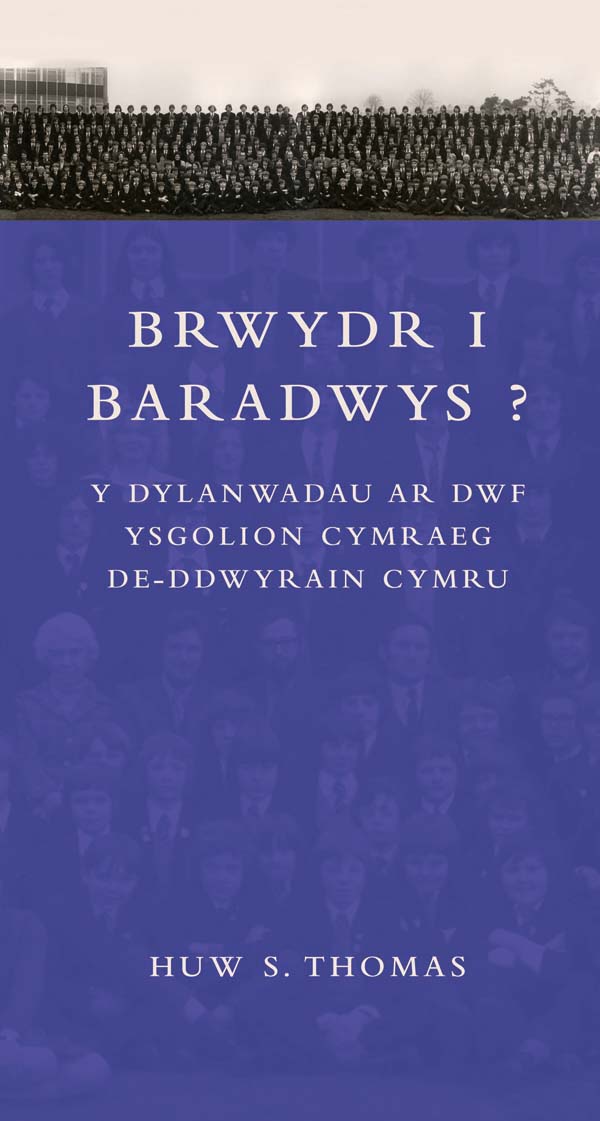Brwydr i Baradwys?
Y Dylanwadau ar Dwf Ysgolion Cymraeg De-ddwyrain Cymru
Author(s) Huw Thomas
Language: Welsh
- July 2010 · 352 pages ·216x138mm
- · Hardback - 9780708322970
- · eBook - pdf - 9780708322987
- · eBook - epub - 9781783164134
This pioneering volume examines the numerous, multi-layered and co-reactionary influences on the extraordinary growth of the Welsh medium Schools of south-east Wales. This is not a history, but a multi-discipline, linguistic, social, psychological, political and educational study analysing the struggle it is argued which was chiefly responsible for overturning the linguistic shift. Equally extraordinary is the fact that no similar study has been conducted before. Balance is maintained between critical study and empiric research. The quantitative evidence is based on the responses received to representative samples of over 700 pupils and teachers using various questionnaires, and on data available via Estyn reports and statistical sources. Quantitative evidence was gathered via interviews with individuals ranging from central government to local, the civil service and Local Education Authorities, the Inspectorate, parents and governors, school heads and voluntary groups. It is argued that the power of the sector's dynamo was driven from the bottom up, from the direction of teachers, and parents in particular, but that individuals within local, national and international politics used their discretion on a meso and macro level to influence support structures which, more often than not, facilitated the actors' efforts. More than policies or parties, individuals proved to be the main influences. The theoretical and conceptual structures of macro language, identity, structure and actor are described in order to unravel the complex weave of influences, and these are the frameworks on which the powers at work in the movementA"'s development were analysed on its long and arduous journey towards national linguistic paradise. The Welsh School is, therefore, placed in a global context.
Ysgolion Uwchradd: Ysgol Gyfun Bro Morgannwg, Y Barri Ysgol Gyfun Gwyr, Abertawe Ysgol Gyfun Cwm Rhymni, Caerffili Ysgol Gyfun Y Cymer, Rhondda Ysgol Gyfun Gwynllyw, Torfaen Ysgol Gyfun Glantaf, Caerdydd Ysgol Gyfun Plasmawr, Caerdydd Ysgol Gyfun Llangynwyd, Maesteg Ysgol Gyfun Llanhari, Pontyclun Ysgol Gyfun Rhydfelen, Rhondda Cynon Taf Ysgol Gyfun Rhydywaun, Aberdar Ysgol Gyfun Ystalyfera, Castell Nedd Ysgolion Cynradd: Ysgol Gynradd Gymraeg Bro Eirwg, Caerdydd Ysgol Bro Sannan, Caerffili Ysgol Gynradd Gymraeg Bryntaf, Caerdydd Ysgol Gynradd Gymraeg Caerffili, Caerffili Ysgol Gynradd Gymraeg Cefn Coed, Caerdydd Ysgol Gynradd Gymraeg Coed y Gof, Caerdydd Ysgol Gynradd Gymraeg Cwm Derwen, Y Coed Duon Ysgol Gynradd Gymraeg Dewi Sant, Llanelli Ysgol Gynradd Gymraeg Gwaelod-y-Garth, Caerdydd Ysgol Gynradd Gymraeg Ifor Hael , Casnewydd Ysgol Gynradd Gymraeg Llanwenarth, Sir Fynwy Ysgol Lluest/Gymraeg yr Urdd, Abersytwyth Ysgol Gynradd Gymraeg Mynydd Bychan, Caerdydd Ysgol Gynradd Gymraeg Pencae, Caerdydd Ysgol Gynradd Gymraeg Pen-y-groes, Caerdydd Ysgol Gynradd Gymraeg Pont Sion Norton, Pontypridd Ysgol Gynradd Gymraeg Pont-y-gwaith, Cwm Rhondda Ysgol Y Rhymni, Caerffili Ysgol Gynradd Gymraeg Sant Ffransis, Y Barri Ysgol Gynradd Gymraeg Tan yr Eos, Caerdydd Ysgol Gynradd Gymraeg Tonyrefail, Rhondda Cynon Taf Ysgol Gynradd Gymraeg Trelyn, Pengam Ysgol Gynradd Gymraeg Tyderwen/Cynwyd Sant, Maesteg Uned Risca, Gwent Ysgol Y Dderwen, Caerdydd Ysgol Gynradd Gymraeg Y Ferch o'r Sger, Porthcawl Ysgol Y Wern, Caerdydd Ysgol Ynys-lwyd, Aberdar Ysgol Gymradd Gymraeg Ynys-wen, Treorci


